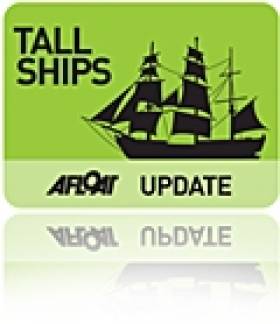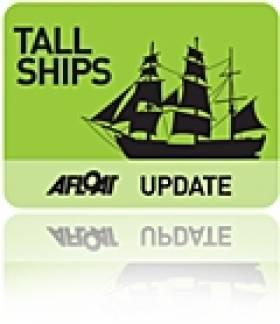Displaying items by tag: Astrid 'Gathering of the Sea'
Tall Ship Astrid, A Sorry Sight for Irish Waters
#astrid – A month after she hit rocks near Oysterhaven, Kinsale, County Cork, during the Irish Sailing Association (ISA) Gathering Cruise, the 42–metre Dutch Tall Ship Astrid makes a sad picture, still trapped on rocks, her beautiful sails torn and ripped by the sea but amazingly her rig still intact.
A night before the accident, on July 23rd, the only square rigger on the cruise, made for an altogether different picture moored in Oysterhaven Bay.
24 hours later, the 100–year–old vessel hit rocks inside the Sovereign Islands at Ballymacus Point, near Kinsale during a promotional photocall.
The training ship had lost power and was apparently driven on to rocks by a strong southerly wind at the western entrance to Kinsale Harbour. The grounded vessel quickly took on water.
A lot has happened since then, none of it for the good of Astrid though. Thoughts of any salvage attempt of this great hull have fast receded. For now the scene is just a daily reminder why water safety cannot be taken for granted and how impressive the Irish Rescue services were on July 24th, rescuing all 30 crew and trainees. A number of accident investigations are underway.
For all Afloat's previous stories on the Tall Ship Astrid Rescue click this link.
The Astrid "Gathering at Sea" for July Sail-Away
#TallShips - Sail Training Ireland and Dutch based At Sea Sail Training are to the host the "Gathering at Sea" between 14-28 July.
This event will see the Tall Ship Astrid sail from Southampton to Cherbourg via Kinsale.
The 14 day voyage is part funded by the European Youth in Action Project and is the goal of International Exchanges to unite youngsters from all over Europe.
Sailing a vessel together is the best way to experience each other's cultures in real life. As we would like to offer this experience to as many young people as possible, we apply for funding with the EU program Youth in Action.
The Astrid, "Gathering at Sea" is available for 15-25 year olds and the European Union exchange programme as stated above to take in the following ports of Southampton to Cherbourg via Kinsale. Participating countries are from France, The Netherlands, UK and Ireland.
The costs are: €925 (normal fee €1,295), due to funding from the EU the price is reduced and where there is to be a 70 % of the transfer costs back). For further details contact Monique in At Sea Sail Training at this email: [email protected]































































